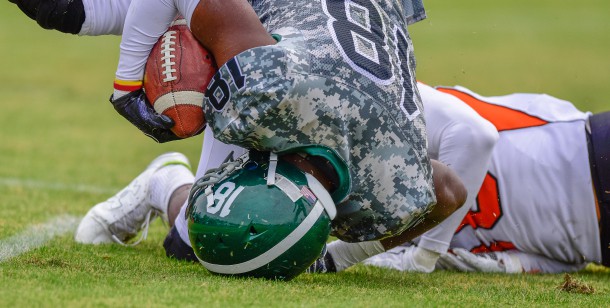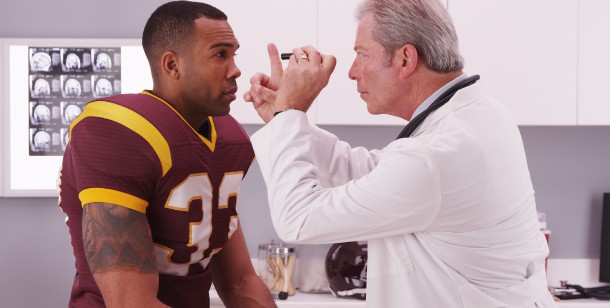Head injuries are notorious for causing alarm with excessive bleeding and swelling, but what happens when there is no evident external damage? It’s important to remember that, even if everything looks normal after taking a bump to the head, there is still a high risk for a concussion. But how do you tell the difference between a simple headache and a concussion? Keep reading to learn more about identifying a concussion and when to go to ER for a concussion.

What is a Concussion?
A concussion is a type of traumatic brain injury caused by a bump, blow, or jolt to the head that causes the brain to move around in the skull. This kind of sudden movement causes a chemical change in the brain, oftentimes causing damage to the brain cells. This kind of trauma to the brain can often be called a minor injury because a concussion is not usually life-threatening; however, there are potentially serious long-term effects.

What Activities Cause a Concussion?
When answering the question of when to go to ER for concussion, we need to understand that concussions are most frequently caused by a head injury inflicted by contact sports, but there are other common causes. Falls down the stairs or even a car accident can all cause a concussion. Some sports that have the most players with reported concussions include football, equestrian sports, basketball, hockey/field hockey, and soccer.
Common Concussion Signs & Symptoms
Concussion symptoms may vary, and many people experience no obvious symptoms. However, these are a few common symptoms to look out for if you have recently experienced a head injury:
- Headache
- Nausea
- Ringing in the ears
- Vomiting
- Fatigue or drowsiness
- Blurry vision
- Slurred speech
- Fogginess or confusion
- Amnesia
- Dizziness or seeing stars
- Seizures
Should you have a concussion that goes untreated, or worse, have suffered multiple concussions, long-term side effects may occur. Here are some of the potential dangers of a serious and untreated concussion:
- Concentration and memory complaints
- Irritability and other personality changes
- Sensitivity to light and noise
- Sleep disturbances
- Psychological adjustment problems and depression
- Disorders of taste and smell
- Loss of consciousness
If you experience any of these side effects, it is essential that you seek emergency treatment and then the advice of a neurological expert. Not only can these side effects worsen over time, but they can also become permanent.

How Do You Know if a Concussion is Serious?
Any time you experience a head injury, you should treat it seriously and find a doctor. Even a seemingly minor head injury can cause a concussion, so the best thing to do is make the assumption that your head injury is serious and seek medical attention. If you choose to forgo taking a trip to the doctor immediately following your injury, be sure to take action if you are experiencing nausea, vomiting, or any other concussion symptoms.

What Can an Emergency Room Do For a Concussion?
If they suspect that you have a concussion, your emergency room doctor may conduct several cognitive tests to evaluate the state of your brain. These tests determine several factors like memory, concentration, motor skills, and ability to recall information. Brain imaging may also be recommended for people with particularly concerning symptoms like severe headaches, seizures, or repeated vomiting. CT scans and MRIs can assess the brain after injury and identify changes or diagnose complications.

When Should You Go To The Hospital After Hitting Your Head?
The best thing that you can do after hitting your head is to seek medical treatment as quickly as possible. However, if you neglected to go to an urgent care or emergency room right away, then you should seek emergency departments near you if you experienced any of the aforementioned symptoms and side effects. Should you still be wondering when to go to ER for concussion, the sooner you have your injury looked at, the better.
